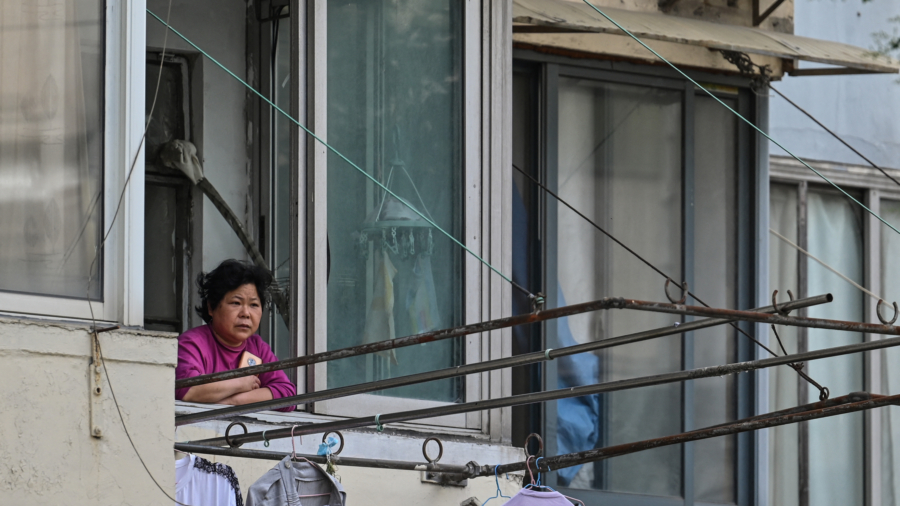BEIJING—On a balmy Sunday night, residents of an upscale Shanghai compound took to the streets to decry lockdown restrictions imposed by their community. By the following morning, they were free to leave.
The triumphant story quickly spread on chat groups across the Chinese city this week, sparking one question in the minds of those who remained under lockdown: Shouldn’t we do the same?
By the end of the week, other groups of residents had confronted management in their complexes, and some had won at least a partial release.
While it’s unclear how widespread they are, the incidents reflect the frustration that has built up after more than seven weeks of lockdown, even as the official number of new daily cases has fallen.
They also are a reminder of the power of China’s neighborhood committees that the Chinese Communist Party (CCP) relies on to spread propaganda messages, enforce its decisions, and even settle personal disputes. Such committees and the residential committees under them have become the target of complaints, especially after some in Shanghai and other cities refused to allow residents out even after officials claimed restrictions were relaxed.
More than 21 million people in Shanghai are now in “precaution zones,” the least restrictive category. In theory, they are free to go out. In practice, the decision is up to their residential committees, resulting in a kaleidoscope of arbitrary rules.
Some are allowed out, but only for a few hours with a specially issued pass for one day or certain days of the week. Some places permit only one person per household to leave. Others forbid people to leave at all.
“We have already been given at least three different dates when we are going to reopen, and none of them were real,” said Weronika Truszczynska, a graduate student from Poland who posted vlogs about her experience.
“The residential committee told us you can wait a week, we are going to reopen probably on June 1,” she said. “No one believed it.”
More than a dozen residents of her complex, many under umbrellas on a rainy day, confronted their managers on Tuesday, two days after the Sunday night breakout at the upscale Huixianju compound.
The residents, who were mostly Chinese, demanded to be allowed to leave without time limits or restrictions on how many per household. After the demands were not met, some returned to protest a second day. This time, four police officers stood watch.
On Thursday afternoon, community representatives knocked on the doors of each resident with a new policy: Write their name and apartment number on a list, take a temperature check, scan a barcode—and they were free to leave.
“We got the possibility of going out just because we were brave enough to protest,” Truszczynska said of her fellow residents.
The Shanghai lockdown has also prompted resistance from people being taken away to quarantine and workers required to sleep at their workplaces. Videos on social media showed what were said to be employees of a factory operated by Taiwan’s Quanta Computer Inc. trying to force their way out of the facility in early May.
The CCP’s zero-COVID campaign has been aided by an urban environment in which hundreds of millions of people in China live in gated apartment compounds or walled neighborhoods that can be easily blocked off.
The front line for enforcement are the neighborhood committees that are responsible for keeping track of every resident in every urban household nationwide and enforcing CCP’s orders.

The incident at Huixianju prompted others to speak out. In a series of videos that circulated this week, about two dozen people march toward the Western Nanjing Road Police Station, chanting “Respect the law, give me back my life.”
Residents of a compound in Jing’an district saw the gates of neighboring compounds open over the past month—yet theirs remained locked. On Wednesday, about two dozen gathered at the gate, calling out to speak with a representative.
“I want to understand what are the neighborhood leaders planning?” one woman asks in a video of the incident. Another woman chimes in: “Are you making progress?” A third resident points out that they should be free by now, since the compound has been case-free for a while. “Didn’t they say on television that things are opening up? We saw it on television,” an older man says.
The next day, the community issued one-day passes—residents were allowed out for two hours on Friday, with no word on what would happen after that.
Shanghai authorities have declared a June target for life to return to normal. But some people aren’t waiting, pushing the boundaries bit by bit.
On Thursday night, more than a dozen young people gathered for a street concert in the same district where Sunday’s protest took place. Video of the last song, “Tomorrow will be better,” was shared widely on social media.
A police car parked nearby with its flashing red and blue lights and headlights on. As the final song drew to a close, an officer wearing a face shield strode toward the group and said, “OK you’ve had enough fun. It’s time to go back.” The crowd dispersed.

